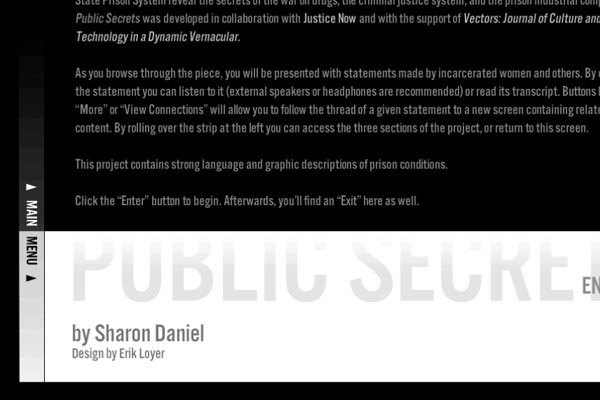Public Secrets

- CreatorSharon Daniel & Erik Loyer
- Year Published2007
- Originially Published InVectors
"Public Secrets" was originally published in Vectors: Journal of Culture and Technology in a Dynamic Vernacular, Volume 2, Issue 2 (Winter 2007) and republished in 2011 in the Electronic Literature Collection 2. As the authors write: "The expansion of the prison system is possible because it is a public secret - a secret kept in an unacknowledged but public agreement not to know what imprisonment really means to individuals and their communities. As the number of prisons increases, so does the level of secrecy about what goes on inside them. The secret of the abuses perpetrated by the Criminal Justice System and Prison Industrial Complex can be heard in many stories told by many narrators, but only when they are allowed to speak. After a series of news stories and lawsuits documenting egregious mistreatment of prisoners in 1993, the California Department of Corrections imposed a media ban on all of its facilities. This ongoing ban prohibits journalists from face-to-face interviews, eliminates prisoners' right to confidential correspondence with media representatives, and bars the use of cameras, recording devices, and writing instruments in interviews with media representatives. Women incarcerated in California are allowed visits only from family members and legal representatives. Inmates are not allowed access to computers, cameras, tape recorders or media equipment of any kind. Such restrictions preserve the public secret. For the past three years, I have visited the Central California Women's Facility [CCWF] as a legal advocate. I work with a non-profit, human rights organization, Justice Now (http://jnow.org/). Together we have been documenting conversations with women prisoners at CCWF, the largest female correctional facility in the United States in an effort to unmask the well known, yet still secret injustices that result from our society's reliance on prisons to solve social problems. Given the ban on conversations with the media, I would not have had access to the women who have contributed to Public Secrets without the support of Justice Now. As a "legal advocate" I am allowed to record my conversations with the women and solicit their stories, ideas, and opinions."--From Electronic Literature Collection 2
Sharon Daniel's Website Erik Loyer's Website In The NEXT ELMCIP Entry Electronic Literature Directory Entry I ❤️ E-Poetry Entry